Science & Technology
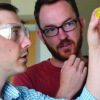 What’s one way to cut a car’s weight by 50 percent and improve fuel efficiency by up to 40 percent? Make it out of carbon fiber instead of steel. Alumnus Chris Kaffer, co-founder and CEO of Denver startup Mallinda, believes his company’s reusable carbon-fiber composite can play a vital role in making vehicles more efficient. Now, a $750,000 grant will help move the vision forward.
What’s one way to cut a car’s weight by 50 percent and improve fuel efficiency by up to 40 percent? Make it out of carbon fiber instead of steel. Alumnus Chris Kaffer, co-founder and CEO of Denver startup Mallinda, believes his company’s reusable carbon-fiber composite can play a vital role in making vehicles more efficient. Now, a $750,000 grant will help move the vision forward.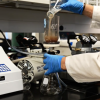 CU Boulder engineers have developed an innovative bio-manufacturing process that uses a fungus in brewery wastewater to create the carbon-based materials needed to make energy storage cells.
CU Boulder engineers have developed an innovative bio-manufacturing process that uses a fungus in brewery wastewater to create the carbon-based materials needed to make energy storage cells. If you gaze at the night sky from Earth in just the right place, you will see the International Space Station (ISS), a bright speck of light hurtling through space at 5 miles per second as it orbits 220 miles above the planet. And if you were an astronaut floating around inside the station, you would see high-tech hardware and experiments designed and built at CU Boulder.
If you gaze at the night sky from Earth in just the right place, you will see the International Space Station (ISS), a bright speck of light hurtling through space at 5 miles per second as it orbits 220 miles above the planet. And if you were an astronaut floating around inside the station, you would see high-tech hardware and experiments designed and built at CU Boulder. CU Boulder will expand its role as a national leader in imaging, materials, nano, bio and energy sciences as part of a collaborative partnership awarded $24 million by the National Science Foundation to launch a new center.
CU Boulder will expand its role as a national leader in imaging, materials, nano, bio and energy sciences as part of a collaborative partnership awarded $24 million by the National Science Foundation to launch a new center.
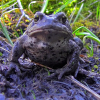 A probiotic treatment has been shown to effectively inoculate endangered Colorado toads and protect them from a virulent fungus that has ravaged the population in recent decades, according to the results of new University of Colorado Boulder research.
A probiotic treatment has been shown to effectively inoculate endangered Colorado toads and protect them from a virulent fungus that has ravaged the population in recent decades, according to the results of new University of Colorado Boulder research.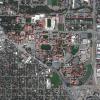 CU Boulder and DigitalGlobe Inc. are partnering to provide access to DigitalGlobe’s industry-leading high-resolution satellite imagery, data and analytics tools to the university’s Earth Lab initiative in order to advance earth and space science research.
CU Boulder and DigitalGlobe Inc. are partnering to provide access to DigitalGlobe’s industry-leading high-resolution satellite imagery, data and analytics tools to the university’s Earth Lab initiative in order to advance earth and space science research.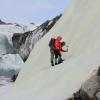 Self-assembling carbon microstructures created in a lab by University of Colorado Boulder researchers could provide new clues – and new cautions – in efforts to identify microbial life preserved in the fossil record, both on Earth and elsewhere in the solar system.
Self-assembling carbon microstructures created in a lab by University of Colorado Boulder researchers could provide new clues – and new cautions – in efforts to identify microbial life preserved in the fossil record, both on Earth and elsewhere in the solar system. A NASA mission involving CU Boulder was successfully launched from Cape Canaveral, Florida, at 5:05 p.m. MDT Thursday night and is on its way to explore an asteroid, setting the stage for a better understanding of the evolution of our solar system.
A NASA mission involving CU Boulder was successfully launched from Cape Canaveral, Florida, at 5:05 p.m. MDT Thursday night and is on its way to explore an asteroid, setting the stage for a better understanding of the evolution of our solar system. Ever caught yourself daydreaming of your next vacation or an old memory? Do you wonder what your idle thoughts throughout the day actually mean? If so, scientists at the University of Colorado Boulder have a free smartphone app that might help shed more light on how and why the mind wanders.
Ever caught yourself daydreaming of your next vacation or an old memory? Do you wonder what your idle thoughts throughout the day actually mean? If so, scientists at the University of Colorado Boulder have a free smartphone app that might help shed more light on how and why the mind wanders.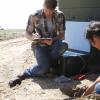 While the earthquake that rumbled below Colorado’s eastern plains May 31, 2014, did no major damage, its occurrence surprised both Greeley residents and local seismologists. To some Greeley residents, the magnitude-3.2 earthquake felt like a large truck hitting the house.
While the earthquake that rumbled below Colorado’s eastern plains May 31, 2014, did no major damage, its occurrence surprised both Greeley residents and local seismologists. To some Greeley residents, the magnitude-3.2 earthquake felt like a large truck hitting the house.


